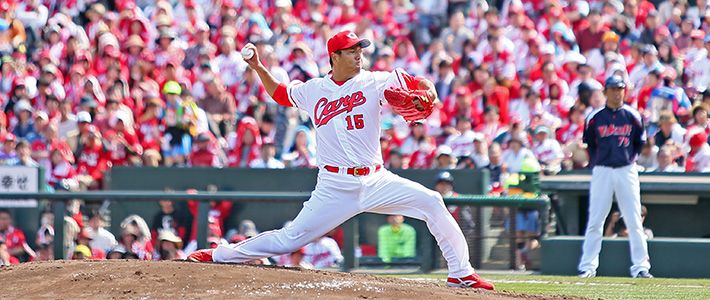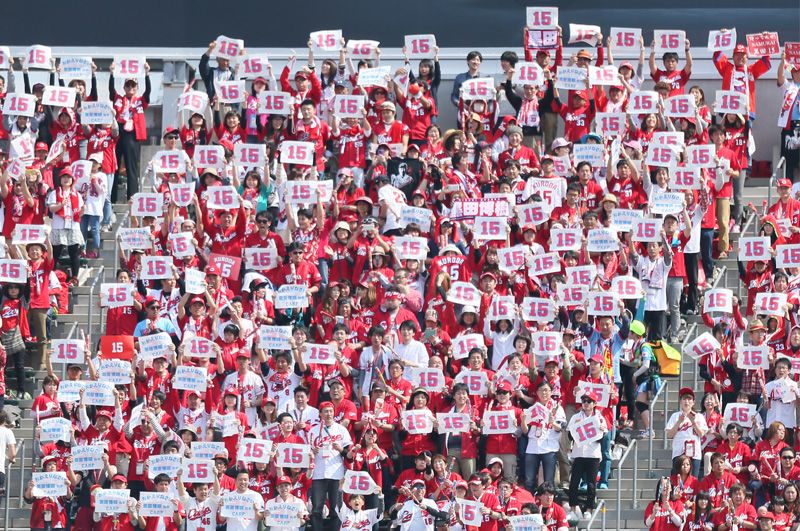
Pitching from the Heart: Kuroda Hiroki Reconnects with Baseball Fans in Japan
Society- English
- 日本語
- 简体字
- 繁體字
- Français
- Español
- العربية
- Русский
Over 30,000 Hiroshima Toyo Carp fans packed into a sundrenched Mazda Stadium on March 29 to watch Kuroda Hiroki take the mound in the season opener against the Tokyo Yakult Swallows. The atmosphere was electric as the Carp loyal welcomed their beloved pitcher back after seven seasons as a Major Leaguer. A hush fell over the stands as the umpire started play, with all eyes falling on Kuroda for the much anticipated first pitch. Seven years of patient waiting erupted into joyful cheers from fans when he forced the first out of the game.
A Run on the Ticket Box
Kuroda made a name for himself during his career in Japan and the United States as a reliable starter, racking up 182 combined wins as of the end of the 2014 season. As a pitcher for the Los Angeles Dodgers and New York Yankees, he became the first Japanese transplant to Major League Baseball to post double-digit wins for five consecutive seasons. This stellar performance sparked a bidding war among several major league clubs to sign the talented pitcher. However, in December of last year Kuroda chose to return to Hiroshima, accepting a contract worth one-fifth of the $16 million salary he received in 2014 with the Yankees.
The major league star’s decision was big news. Many in Japan were moved by the decision as it showed Kuroda was not driven by money, which has become the paramount motivator in sports, but by something greater. Now in his nineteenth season and nearing 40, he understands that his remaining mound appearances are limited. “I chose to rejoin the Carp,” he explained, “because each pitch would have more meaning.”
The reaction of Hiroshima fans to the news of Kuroda’s return was immediate and intense. In a first for the 65-year-old club, the roughly 8,400 season tickets available at the club’s Mazda Stadium sold out in January, just three weeks after the pitcher made his announcement. Interestingly, many of the new ticket sales came from individual fans, rather than from businesses and other organizations. When Kuroda merchandise went on sale on the first of February, items were snapped up so eagerly that sales on that day outstripped figures for the same month a year earlier. And a new home attendance record was set for a preseason game when 31,255 packed into the Mazda Stadium to watch Kuroda pitch. The economic windfall from all this excitement is thought to be as high as ¥25.6 billion, which is particularly impressive considering that only 2.8 million people live in Hiroshima Prefecture.
Giving Everything with Every Pitch
Kuroda was born in 1975 in Osaka. His father Kazuhiro was a former baseball player in the Japanese professional league and coached his son’s youth team, where the young pitcher first learned to grip and throw a ball. His mother Yasuko was an athletically gifted high school physical education teacher who competed as a shot putter in the qualifying rounds for the 1964 Tokyo Olympics. Although Kuroda lost both his parents early in his life, he most certainly has them to thank for the towering figure and sturdy pitching arm that has seen him through his career.
Kuroda honed his natural talents through persistent training and firm determination. He is known for being strong minded and unbending, even in dealings with friends and family. He understands, however, that he hasn’t gotten to where he is on his own, reminding himself of this fact by embossing the word kansha (gratitude) on his glove.
Kuroda posted his first season of double-digit wins in his fifth year as a pro. Over the years that followed he continued to work to expand his range of pitches and refine his form. A fighter by nature, he developed into the Carp’s ace pitcher by racking up a string of complete games, proving his ability to shut down opponents and get out of tight situations. Kuroda was so intense on the mound that occasionally his emotions boiled over in tears back in the dugout after a team managed to score a run off him. Hiroshima fans embraced Kuroda for his all-or-nothing style of play.
 Hiroshima Carp fans hold up signs showing Kuroda’s uniform number at Mazda Zoom Zoom Stadium on March 29, 2015. (©Jiji)
Hiroshima Carp fans hold up signs showing Kuroda’s uniform number at Mazda Zoom Zoom Stadium on March 29, 2015. (©Jiji)
A Team of the People
The Hiroshima Carp were established as a symbol of recovery and hope five years after the city was decimated by the atomic bomb dropped near the end of World War II. From the outset the club has been a fixture in the lives of residents. Chronically in the red, the team was saved from folding early on when locals held a “barrel drive”(*1) to collect money. In 1957, the city’s business community donated the necessary funds to equip the municipal baseball stadium with lights so the team could hold night games.
Hiroshima’s first Central League title came in 1975, ushering in a golden era for the club. Over the next 17 seasons the team produced a steady flow of star players, collected five more league pennants, and won three Japan Series titles. Large corporate team sponsors are the norm in Japanese baseball but the Carp’s success proved that an independently funded local club could make it in the country’s professional league.
However, the team’s fortunes took a turn for the worse when the league decided in 1993 to introduce a free-agent system. Almost overnight players’ salaries skyrocketed. Without a parent company to foot the bill, Hiroshima often found itself priced out of the market for top players and unable to muster the funds to retain star talent on its roster. The club’s performance soon declined, finishing third in 1997 and thereafter remaining in the bottom half of the standings.
The sole bright spot for the club during these dark days were Kuroda’s battles on the mound. When he earned free agency in 2006, fans in the right-field stands displayed a large banner on the final game of the season urging him to stay. A giant flag bearing Kuroda’s number 15 waved overhead as the Carp faithful held up countless signs with their personal messages and repeatedly called out his name. Looking out over the scene, the pitcher was visibly moved. He would later say that the fans’ actions made him feel he was needed at the club.
A Promise to Stay
Hiroshima is the only regional professional team to have remained in the same city since it was founded. The prospect of losing their beloved pitching ace brought fans of all generations together. Their efforts paid off when at the end of the 2006 season Kuroda proclaimed he was staying with the club, stating he couldn’t see himself pitching in front of a different crowd. Fans were ecstatic, praising the pitcher as a man unaffected by the sway of money.
Kuroda may have been impervious to the siren call of money, but he was unable to put aside his dream of playing in Major League Baseball. With the backing of fans, the pitcher announced at the close of the 2007 season that he was leaving Hiroshima and heading to the United States. The seeds of trust had already been planted, however, and when Kuroda announced that if he were ever to return to Japanese baseball it would be with the Carp, fans trusted his words and waited for that day to arrive.
Even while overseas, Kuroda kept his connection with Hiroshima alive, leaving his family behind in the United States every year to spend a month in the city. When his contract with the Dodgers expired at the end of 2010, the Carp offered Kuroda the opportunity to return. The pitcher chose to stay in the major leagues, where he pitched another four seasons, but each year Hiroshima repeated the offer and eventually he was swayed.
Tragedy Turns the Tide
In August 2014, landslides caused by torrential rain buried houses in the Asaminami and Asakita districts 10 kilometers north of central Hiroshima, killing over 70 people. Following the tragedy Kuroda, who was still in the United States, collected donations and made other efforts to aid victims. Two months later, in October, he visited the site on the urging of a friend and was extremely shaken by the destruction he saw.
Volunteers working at the site recognized Kuroda and soon a wall of people formed around the pitcher. A group of around twenty people asked to take a photograph with the former Hiroshima star, and as they stood among the mud and wreckage of houses Kuroda’s stern expression stood out against the smiling faces around him. The interaction rekindled a spark in the pitcher. Later that evening Kuroda told a friend over dinner that his greatest motivation to continue playing baseball was to provide inspiration to others.
A Decision to Return
Kuroda and Hiroshima began negotiations in the closing months of 2014, reaching a turning point during the third round of talks in mid-December. The Carp offered Kuroda a one year contract worth over ¥400 million (roughly $3 million), well short of the $18 million reportedly proffered by one major league team but still the highest salary ever offered by the club.
The pitcher was moved by the earnestness of the offer, and as he had done in 2006, Kuroda followed his heart, not his pocketbook. Facing his fortieth birthday he knew that the clock was ticking down on his career and he was eager to find the place where he would be most content finishing off his time on the mound.
On Christmas, Kuroda announced from his home in Los Angeles that he would be returning to Hiroshima. He decided that the most important thing was to have a club, fans, and a city to return to.
Fulfilling a Promise to Fans
After seven years in the majors, Kuroda arrived back in Hiroshima with ¥9 billion in the bank. He acknowledges that he’s still a commodity in the big leagues, having reportedly rejected a multimillion dollar one year offer to stay in the United States. “Pitching in the major leagues allowed me to experience baseball on a different scale,” he notes, “but there is more satisfaction in coming home to the waiting Hiroshima fans than continuing to play in the majors.”
Kuroda threw seven scoreless innings on his way to winning the March season opener. In his first after-game interview since returning to the club he summed up his feelings by telling the fans in the stands that the “Hiroshima mound was tops.” Kuroda’s dramatic homecoming will be talked about by Carp fans for years to come. But it also gives the club a much needed boost this year as it aims to build a new era for the team and city.
(Originally published in Japanese on April 13, 2015. Banner photo: Kuroda Hiroki pitching in his homecoming game for the Carp on March 29, 2015; ©Jiji)
(*1) ^ In 1951, when the club was struggling financially and faced the prospect of folding or merging with another organization, fans worked to save the team by collecting donations in a sake barrel placed at the entrance of the team’s stadium.
New York Yankees Major League Baseball Japanese professional baseball Hiroshima Carp Kuroda Hiroki